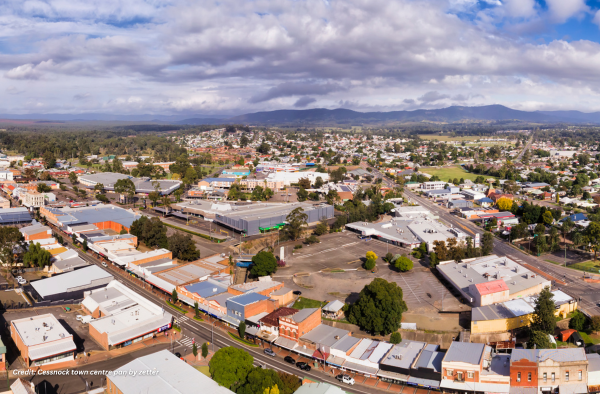Cessnock councillor challenges ‘smart city’ theories
Share

An NSW council is embroiled in a contentious battle over the smart city conspiracy theory, with residents alleging that councillors have joined a sophisticated surveillance network.
Supporters of the smart city conspiracy theory, who are convinced that powerful individuals have devised a scheme to confine residents within their communities using digital monitoring and limited transportation options, packed a session of Cessnock City Council on Wednesday to back a proposal put forth by council member Jessica Jurd. According to local reports, about 100 members of the public observed Councillor Jurd’s proposal, which sought clarification on Cessnock’s involvement in the idea of smart cities and its timeline.
Debunking the smart city conspiracy
The conspiracy theory surrounding “smart cities” revolves around intense privacy worries regarding the implementation of advanced infrastructure such as high-tech traffic controls and camera surveillance. This topic is closely linked to theories about 15-minute cities, which strive to provide urban residents with easy access to all their essential services within a 15-minute distance.
Supporters of the conspiracy theory claim that the smart and 15-minute city ideals are part of a covert agenda by authorities to limit people’s freedom of movement. The speculation gained momentum due to the COVID-19 lockdowns, which were perceived as confirmation of their convictions. Some conspiracy theorists believe that the government may go as far as seizing people’s cars and implementing a restriction on travelling more than 15 minutes away from home.
Councillor Jurd urged her social media followers to participate in Wednesday’s public meeting and question her fellow councillors’ support for the smart city concept.
The issue? Cessnock lacks a smart city plan and the necessary infrastructure to support it.
Demand for transparency
The council meeting on Wednesday drew a large crowd eager to witness Councillor Jurd’s proposal. The council’s general manager was approached with five questions regarding Cessnock’s involvement in a smart city initiative, including details on when the signing up took place and the potential financial and social implications.
“Residents are concerned that Cessnock has joined the smart cities like Newcastle has. They are concerned about how this could impact their quality of life,” Councillor Jurd asserted.
During the meeting, a long-time resident of Cessnock expressed similar worries to Councillor Jurd, pointing out the closure of an ANZ branch and the introduction of self-serve check-outs in local supermarkets as signs of urban development in Cessnock. Councillor Jurd’s enquiries were addressed in January with a council memo stating that Cessnock had not participated in any smart city initiatives.
“Is Cessnock already signed up to join the Smart Cities transformation? No,” the memo, dated January 18, repeatedly stated.
Several council members at the meeting expressed their disapproval of Councillor Jurd for persisting with the matter even after receiving this confirmation.
The discussion took a sharp turn, with the audience frequently expressing their disapproval through booing and shouting. During the incident, a gallery attendee was ejected, and Mayor Jay Suvaal warned several others of a similar fate. Councillor Anthony Burke expressed frustration that some councillors persisted in promoting the conspiracy theory online despite having received the January memo.
“That just promotes fear within our community,” he said, to loud heckling from the gallery.
“I don’t understand how we can keep going on and on and on when the answers are already there. I am sure if there is a decision to be made whether this council is part of a smart city or not, we will know about it.”
Mayor Suvaal strongly denied the notion that a smart city was being implemented in Cessnock, calling it “complete conspiracy theory propaganda.” By a vote of 9 to 2, council members rejected councillor Jurd’s proposal to look into smart cities because they claimed they lacked the resources to do so and that the idea wasn’t pertinent to their area.
Cessnock’s ‘smart city’ status
According to the memo dated January 18, Cessnock has not officially joined any smart city initiatives. The director of planning and environment at Cessnock Council, Peter Mickleson, stated to news.com.au that Cessnock did not have any smart city technologies. According to Mr. Mickleson, the most advanced infrastructure in Cessnock consists of a small number of LED lights and a standard CCTV camera in a public park.
“We don’t have infrastructure to the extent of a number of cities, like rubbish bins that can tell you when they’re full or smart cameras monitoring public places or anything like that. It’s not something that this council has ever considered,” he said.
According to Mr. Mickleson, achieving a “15-minute city” without any high-tech infrastructure was not feasible for the regional centre.
“The reality is that a lot of people in Cessnock work out in the mines. They drive two hours to work and that’s not going to change because that’s where the mines are,” he said.
“For a place like Cessnock or a similar regional town on the fringes of the metropolitan area, achieving a 15-minute city would be very, very unlikely at least in the short to medium term.”
When asked about the possibility of Cessnock Council implementing restrictions on residents’ car usage and travel beyond their neighbourhoods, Mr. Mickleson responded: “That statement is way from left field. That’s certainly nothing that’s ever been considered by this council.”
Smart city protests ignite
Several cities, including those in Australia, have embraced the concept of 15-minute cities, or smart cities. Earlier this year, a demonstration took place in the UK to challenge the 15-minute city plans in Oxford, which has sparked significant controversy. An Oxford council is proposing a plan for 15-minute neighbourhoods that includes implementing traffic measures to reduce congestion and discourage cars from using small suburban streets, while also prioritising buses and bikes.
These measures have sparked debate, as drivers may face fines of up to $130 for entering specific streets during designated hours. The council has emphasised that city residents will still have access to all suburbs, although they may have to use major roads instead.
In Newcastle, just 50 kilometres east of Cessnock, there is a smart city that genuinely exists. Newcastle prides itself on being the most advanced city in Australia, implementing a smart city strategy, and introducing numerous “smart poles” that serve multiple public functions. Despite the developments in Newcastle and Oxford, a technologically advanced city has yet to materialise in Cessnock.
Councillor Mitchell Hill elaborated during Wednesday’s meeting: “I almost couldn’t pick a more different location to Cessnock than Oxford. Maybe New York City. The thought that we would try to implement such similar policies in an area like Cessnock is, I think, a little bit absurd.”
According to Mr. Mickleson, concerns about smart cities are likely rooted in broader worries about privacy and control.
“There’s a lot of fear that’s been stirred up and people naturally, when they don’t understand something, they’re usually fearful of it,” he said.
“When people don’t have the information or they don’t understand the concepts then they start thinking about all sorts of doomsday scenarios.”
Public Spectrum is the first knowledge-sharing platform in Australia to embrace the entire public sector. This website is a platform where you can connect, collaborate, empower, inspire, and upskill with public sector professionals.




Today’s Pick
11th Annual Aus Goverment Data Summit
April 1, 2025
7th Annual NZ Government Data Summit
May 7, 2025
3rd Public Sector Comms Week
May 14, 2025
Subscribe
We send emails,
but we do not spam
Join our mailing list to be on the front lines of healthcare , get exclusive content, and promos.
AI appointment Australia Australian boost boosts business businesses covid-19 cyber cyber attack cyber security cybersecurity data data breach data management defence Digital employment enhance enhances fraud funding governance government grants infrastructure Innovation Lockdown management new zealand NSW NZ online privacy public Public Sector queensland renewable energy scams security Social Media Technology telecommunications victoria
-

Understanding and building your digital strategy
Digital Government, Opinion
-

Featured Leader: Jamie Morse on multi-channel strategies for communication
Communications, Featured Leader
-

Featured Leader: Tegan Tembe of NSW Treasury on creating solid planning strategies and processes
Featured Leader
-

Wirraka Maya Health Service improves patient care with My Health Record
Learning
Show More-

Effects of ineffective communication in the workplace
Communications, Personal Development
-

7 ways you can enhance your personal development skills
News, Personal Development
-

5 advantages of working in the public sector
News, Personal Development, Professional Development
-

7 causes of communication issues in the workplace
Communications, News, Personal Development
Show MoreLast Viewed